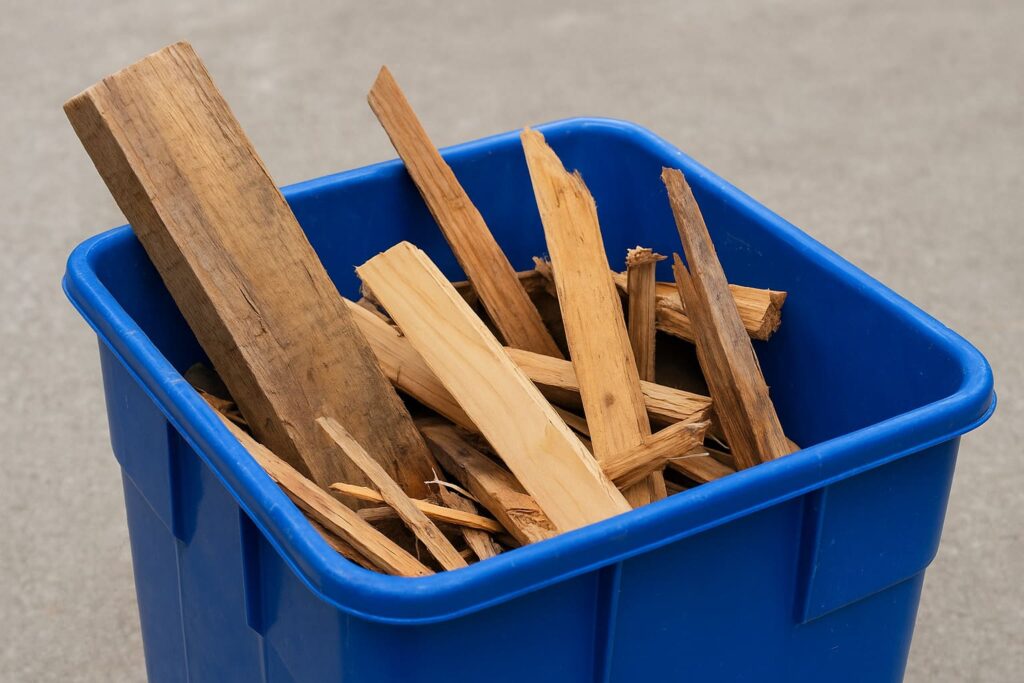What is wood waste recycling, and why does it matter in Winnipeg
Why homeowners should care
- Reduces the environmental footprint of renovations and yard work.
- Keeps potentially reusable wood available for local builders, crafters, and pallet recyclers.
- Lowers the risk that treated or contaminated wood will contaminate compost or burn improperly. When wood is handled properly, it becomes a local resource instead of a disposal headache.
Local wood waste recycling drop-off options in Winnipeg
- 4R Winnipeg Depots accept many kinds of clean, untreated wood and yard waste at depot locations such as Brady Road and Panet. Depots are the first stop for most homeowners with branches, clean lumber, and pallet wood.
- Brady Road Resource Management Facility is a key municipal site for larger and more complicated loads; the city sometimes directs residents with unusual or contaminated material to Brady for proper handling. City of Winnipeg
- Private wood recyclers and pallet companies accept clean pallet wood, lumber offcuts, and other usable material. Local pallet-recycling businesses in Winnipeg collect and repair pallets or process broken pallets into usable boards, mulch, or wood chips. Pallet Recycling Winnipeg
What types of wood are accepted? “Is wood recyclable?” explained
- Clean, untreated wood: dimensional lumber, pallets, crates, and wood offcuts that are free from paint, glue, or heavy contaminants. These are the easiest to recycle or repair.
- Yard wood and branches: branches, prunings, and small logs from yard work are accepted at depots and in yard-waste collection programs. The city’s yard-waste service collects brush seasonally, and depots accept larger drop-offs.
- Pallets and pallet wood: many local businesses specialize in pallet repair and reuse; these are often the best route for industrial wood streams.
Materials that need special handling
- Treated or painted wood: wood preserved with chemical treatments or coated with paint is typically not accepted with clean wood recycling streams because preservatives and coatings can harm composting, incineration, or reuse markets. These often go to specialised processing or disposal at Brady Road.
- Engineered wood or plywood with adhesives: these materials sometimes contain glues and resins that complicate recycling and may need special treatment. Check depot rules before dropping off.
- Contaminated or oily wood: anything soaked with oils, solvents, or hazardous residues should be kept separate and handled according to municipal guidance. If uncertain, consult depot staff.
How wood waste recycling is processed
- Collection and drop-off: homeowners bring sorted loads to depots or schedule a pickup with a private recycler or service like Mr. Garbage.
- Sorting and cleaning: recyclers separate clean wood from treated or contaminated material. Reusable pallets and boards are diverted to repair operations.
- Processing: non-repairable wood may be chipped, shredded, or milled. Chips can become mulch, bedding, biomass fuel, or raw material for engineered products.
- Reuse or final treatment: repaired pallets, reclaimed lumber, and mulch re-enter local markets. Contaminated wood is handled through appropriate disposal or specialist processing channels.
How to prepare your wood for recycling
- Sort at source: separate clean, untreated wood from painted, treated, or engineered wood.
- Remove nails and metal: pull out visible nails, screws, and fasteners where practical. Bundle or stack lumber neatly so handlers can pick it up easily.
- Cut large logs: if possible, cut oversized logs to manageable lengths that fit depot requirements or your pickup container.
- Keep wood dry: wet or mouldy wood is harder to process. Store materials under cover until you can move them.
- Label tricky items: if you have treated wood or mixed materials, label them and call ahead; the depot or recycler can advise.
Local businesses and markets for recycled wood
- Pallet recyclers and repair shops: these companies repair and reuse palettes or break them down for parts. They are practical partners for businesses and homeowners with pallet loads. Pallet Recycling Winnipeg
- Mulch and chip producers: chipped yard wood becomes mulch or substrate for landscaping projects. Depots and private processors route appropriate yard waste into these flows. City of Winnipeg
- Urban lumber and craft reuse: smaller reclaimed-lumber businesses and community woodshops take quality salvaged wood for furniture, community projects, and small construction jobs. Urban-lumber initiatives in Winnipeg highlight local demand for reclaimed boards. YouTube
Common homeowner scenarios and solutions
Renovation cleanout
Storm cleanup and branches
Broken or contaminated wood
How Mr. Garbage helps with wood waste recycling
- Curbside-style pickups: Schedule a pickup for bundled wood and pallets. Crews sort and route material to approved reuse or recycling partners.
- Guidance and sorting: teams advise on what’s accepted, how to separate treated wood, and where to take special materials.
- Documented routing: for larger cleanouts, Mr. Garbage records how material is handled and where it’s sent, useful if you need proof of responsible disposal.
The environmental and economic benefits of wood waste recycling
Environmental benefits
- Reduces landfill volume and methane risk: diverting wood keeps bulky organic material out of landfill cells.
- Saves raw materials: reclaimed wood reduces demand for new lumber and supports sustainable building practices.
- Cuts embodied emissions: reusing wood avoids the emissions tied to manufacturing new timber products. Published reports on circular solutions for wood highlight these gains and push for better reuse systems in urban areas. nzwc.ca
Economic and community benefits
- Local jobs: pallet shops, chip producers, and urban-lumber businesses create local employment and small-business opportunities.
- Affordable materials: reclaimed wood is often a lower-cost option for community groups and small builders.
- Community projects: repurposed wood supports neighbourhood greening, playground repairs, and community carpentry projects.
Rules, safety, and prohibited practices for wood waste recycling
- Don’t mix treated wood with clean wood streams: Treated wood contains chemicals that aren’t compatible with composting, landscape use, or certain recycling routes. If in doubt, call the depot.
- Avoid burning wood with paints or preservatives: Burning treated or painted wood releases harmful pollutants. Follow municipal bylaws and safety rules if you plan to open burning, and obtain permits when required.
- Secure loads in transport: When driving wood to depots, tarps or secure bundling avoids roadside hazards and helps comply with local rules. Failure to secure loads can lead to fines.
- Remove contaminants: Nails, glue, and non-wood attachments lower the recyclability of wood; removing fasteners and separating mixed materials helps processors.
How to find “wood waste recycling near me”
- Start with the City of Winnipeg depot pages, which list accepted items, locations, and hours.
- Search for pallet recyclers and local wood repair shops; many Winnipeg businesses accept pallets and broken lumber.
- Look for mulch and chipping services, regional landscaping, and tree services will often chip yard wood and may accept certain loads for recycling.
- Call ahead; different sites have different rules for treated wood, size limits, and hours.
Real-life example: a Winnipeg neighbourhood reuse project
Conclusion
Frequently Asked Questions (FAQs)
Q1: What types of wood can I take for wood waste recycling?
A1: Clean, untreated wood, like dimensional lumber, pallet wood, and branches, is widely accepted at depots and local recyclers. Treated or painted wood often needs special handling; call ahead.
Q2: Can Mr. Garbage pick up wood waste from my home?
A2: Yes. Mr. Garbage offers pickup services for bundled wood, pallets, and general clean wood loads, and coordinates routing to approved recyclers or depots.
Q3: Is painted or treated wood recyclable?
A3: Treated and heavily painted wood usually requires special processing and is not accepted in standard clean-wood recycling streams. Check with Brady Road or the depot before dropping off treated wood.
Q4: Where can I find a local pallet recycler or wood reuse shop?
A4: Winnipeg has dedicated pallet-recycling businesses and urban-lumber initiatives that repair and reuse pallets or sell reclaimed boards. Search for “pallet recycling Winnipeg” or check local depot listings for referrals.
Q5: What should I do with yard branches and brush after a storm?
A5: Use your seasonal yard-waste collection if available, or take larger volumes to a 4R depot. For very large trees, hire an arborist who can remove and chip the wood; chipping often enables local recycling as mulch.

